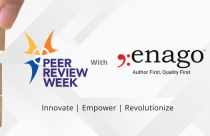Should Peer Reviewers Sign a Code of Ethics?

Increased Scrutiny of a Critical Process:
A Google search for “peer review best practices” will produce over 5,600 results, with numerous examples of detailed manuals and checklists that specify in detail what should happen during a formal peer review process. Search for “peer review code of ethics,” and the results are not so promising! What you will get is, multiple references to organizational statements that include both terms but nothing that specifically outlines a code of ethics for the peer review process.
If you consider that once a submitted research paper or manuscript has been accepted for publication, any subsequent error immediately places the spotlight on the peer review process, it seems unusual that journals don’t take every opportunity to put explicit commitments to quality in place. While it is true, that the entire peer review systems seems to survive on honor among professional academics, that honor counts for relatively little when questions are being asked as to where the ball was dropped when a flawed or fabricated paper makes it through to publication.
The Importance of Symbolism
The Federal Sentencing Guidelines for Organizations (FSGO), last revised in 2004, calculate the penalties to be assessed in cases of corporate malfeasance. One factor that can reduce the size of those penalties is evidence of proactive compliance, including the active promotion and enforcement of a code of ethics. In academic publishing, we have yet to face such multi-million dollar settlements for retracted articles, but the opportunity for proactively embracing a code of ethics as a clear standard of quality could be a clear differentiator in the battle against open access journals.
Up to now journals with a substantive legacy and strong reputation have tended to let that information speak for itself. There has been no need to promote the quality of the internal peer review system, since the reputation of the journal, it is assumed, attracts only the highest caliber of peer reviewers who are honored to be given the opportunity to work for the journal for free, as it will be a tremendous boost to their professional credentials. However, when the system breaks, as it did for The Lancet in the Wakefield MMR vaccine case, the fact that the journal first appeared in 1823 only made the case that much more shocking.
A Natural Alignment
Critics of codes of ethics will often complain that it is difficult to capture every element of a product or service delivery experience in a way that demonstrates an ethical transaction. The peer review process, however, has several key components that align directly with an explicit commitment to conduct of the highest quality: relevant experience, confidentiality, objectivity, and the clear absence of any conflict of interest or prejudice can all be seen as critical components of an ethical service performance.
The Golden Rule
The apparent policy of honor among professional academics is admirable, and trusting your peer reviewers to follow the ethical reciprocity of the Golden Rule of “do unto others as you would have them do unto you,” works well in the vast majority of cases. However, as the competitive pressures increase, and less ethical academics find ways to review each other’s work or, worse still, set-up fake accounts to review their own, the peer review process needs an explicit commitment to ethical conduct, if only to reassure potential authors who are increasingly concerned as to whom can be trusted.









